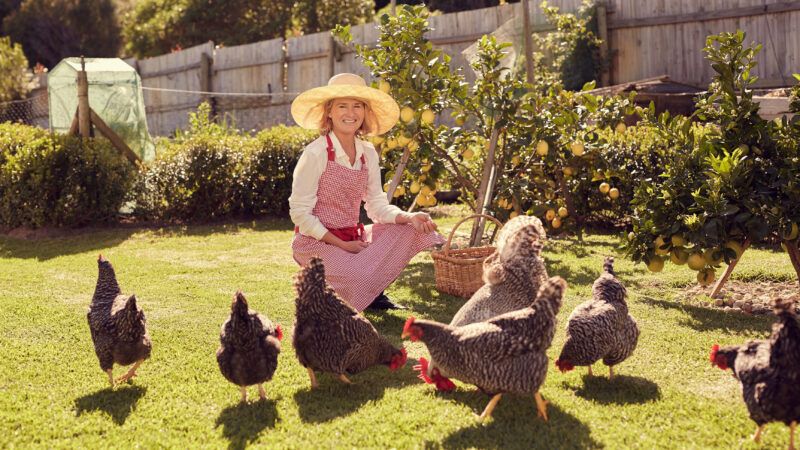Kenosha Legalizes Backyard Chickens—With Plenty of Red Tape
Backyard chickens are slowly making headway, but not without tradeoffs.

This week, the city council in Kenosha, Wisconsin, voted to allow residents to raise backyard chickens. The vote was popular with people who like a side of freedom with their fresh eggs.
"Give people the right, give them the freedom to choose to have chickens," council member Kellie MacKay said in remarks reported by the Kenosha News. "Let them have the freedom to do what their passions are."
Backyard chicken farmers are passionate about many aspects of their lifestyle. "Supporters of keeping backyard chickens note the birds are a prized addition to any yard, providing a regular source for fresh eggs and fertilizer and a natural means of controlling pests such as grubs," I explain in my 2016 book Biting the Hands that Feed Us: How Fewer, Smarter Laws Would Make Our Food System More Sustainable.
While the 10-7 vote in Kenosha in favor of legalizing backyard chickens was a step forward for residents seeking a year-round supply of fresh eggs at home, the new ordinance contains a host of restrictions that may both dampen ownership and pit neighbors against each other. For example, residents who want to raise chickens must first obtain permission from the city council and purchase an annual license—which comes with a catch.
"Before a license would be issued for the keeping of such fowl, the applicant's neighbors would also be notified of the request so they can express any concerns to the city," the News reports.
While Kenosha's new ordinance is imperfect, the drumbeat for expanding access to backyard chickens continues to grow around the country. Recent news reports highlight the trend. Earlier this month, for example, the town board in Rotterdam, New York, approved backyard chickens. The city council in Worcester, Massachusetts, voted last week to create a task force to draft an ordinance allowing backyard chickens. In Chandler, Arizona, the city council may allow more residents to raise chickens in their yards. The local governments in Bethlehem, Pennsylvania, and Forest Park, Illinois, have considered allowing residents to keep backyard chickens.
Data also demonstrate growing excitement over raising backyard chickens. According to the USDA and other sources, interest has exploded in cities and towns of all sizes in recent years, including big cities such as Denver, Los Angeles, Miami, Salt Lake City, and New York. In Biting the Hands that Feed Us, I also note that in 2014 the website BackyardChickens.com—for all your backyard chicken needs—claimed to have more than 280,000 active users. Today, the same site boasts nearly 480,000 members.
To say people should have a right to raise chickens in their yards is not to say that any limitations on the practice are unwarranted. For example, governments that allow residents to raise egg-laying hens also rightly prohibit raising noisy roosters. Oklahoma City, which legalized raising backyard chickens in March, stresses in its rules that "roosters are not allowed."
Critics contend that, in addition to noise complaints, backyard chickens raise health concerns. At least one town has pushed back against backyard chickens because residents raising them, the town's mayor claims, are failing to keep their yards clean, which has attracted rats. Elsewhere, people have raised concerns about backyard chickens concerning the ongoing outbreak of bird flu, which has caused millions of commercially raised chickens to be destroyed as a preventative measure. While bird flu has infected some backyard chickens around the country, their owners can and do take steps to mitigate the spread of the disease.
Whether roosters, rats, or bird flu, concerns over backyard chickens are generally overblown. As I explained in a 2016 article, "a well-maintained chicken coop in a yard… benefits a home and community and poses no more health risks than —keeping a dog or cat."
As I explained in separate columns last year and earlier this year, backyard chicken ownership—and the related push for regulatory reforms that make such ownership possible—are becoming more common daily. With little downside and tremendous upside, the sky will not fall if more cities and towns let residents raise chickens in their backyards.


Show Comments (141)